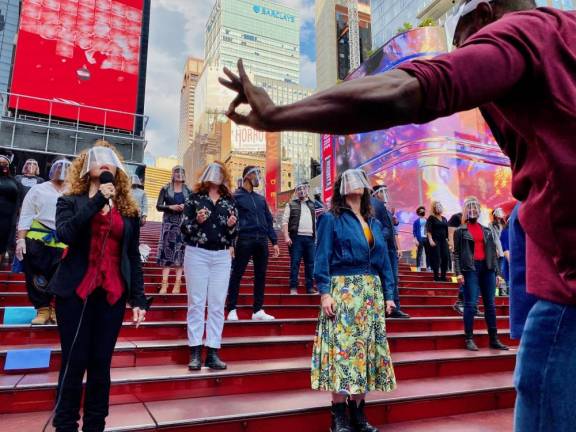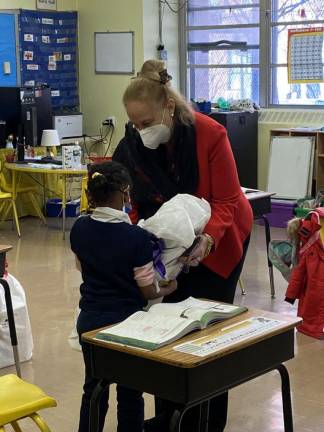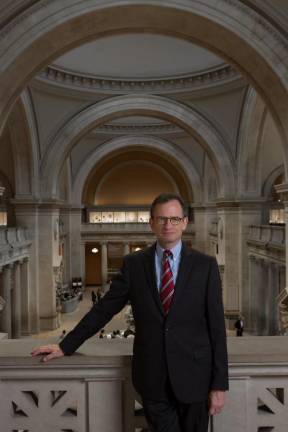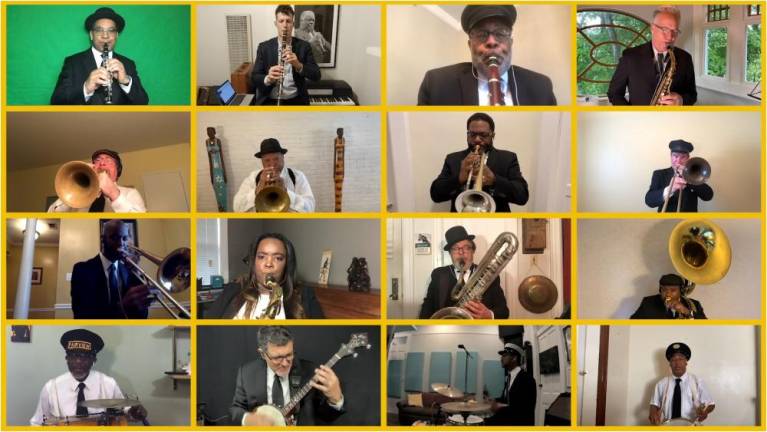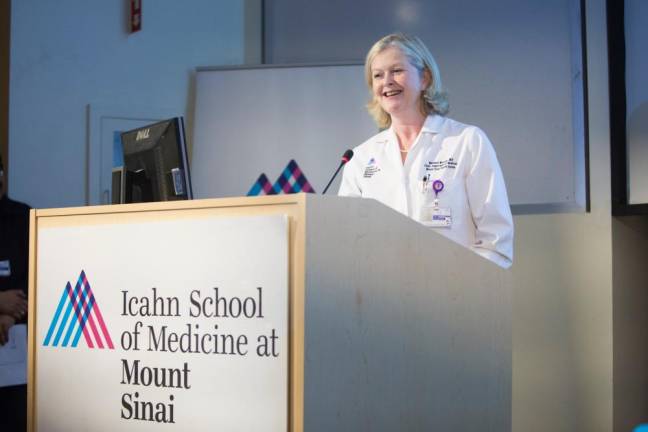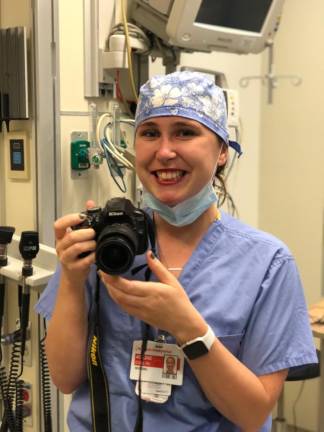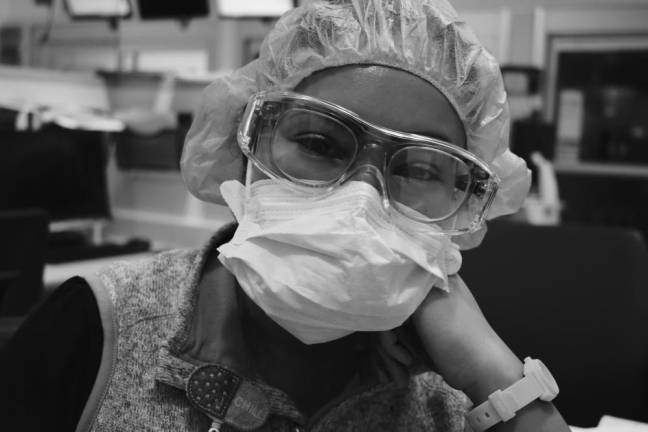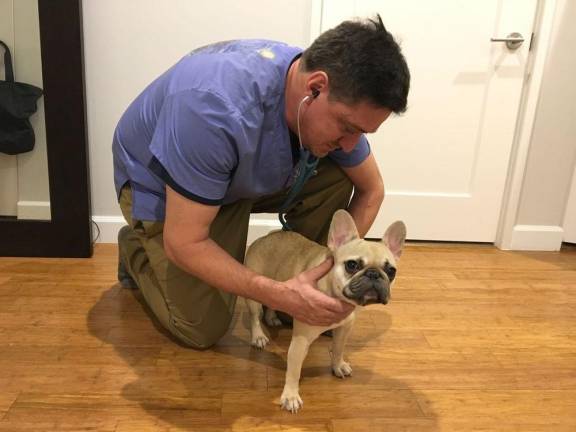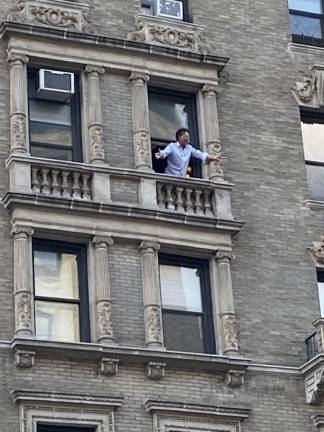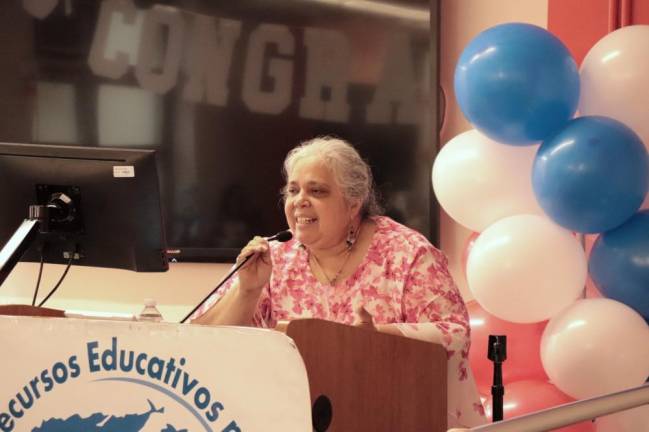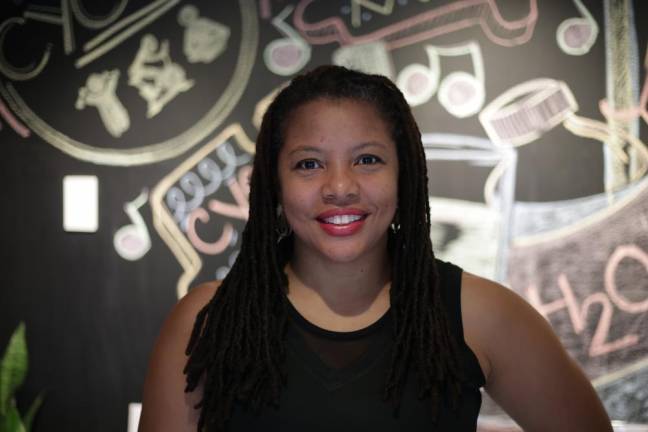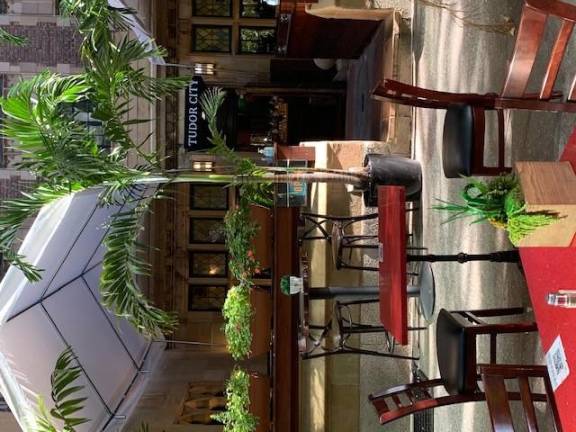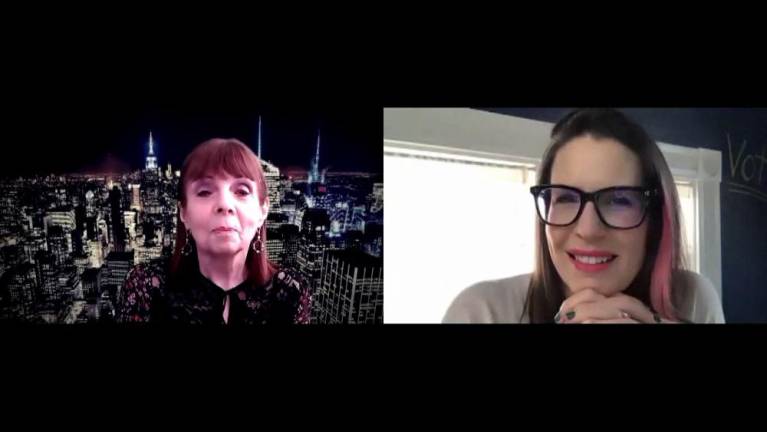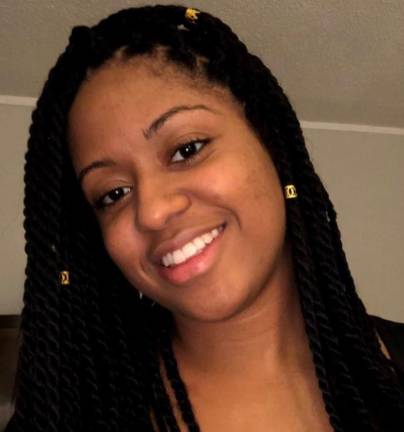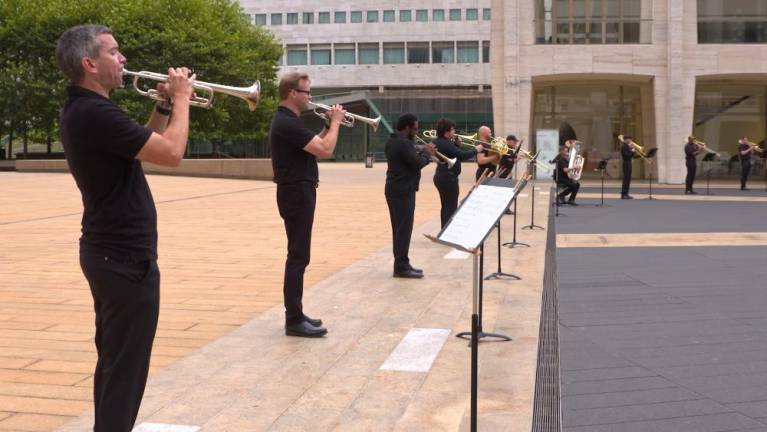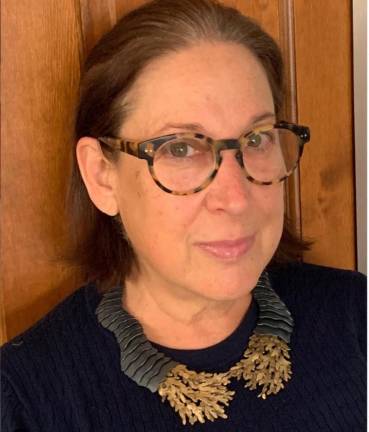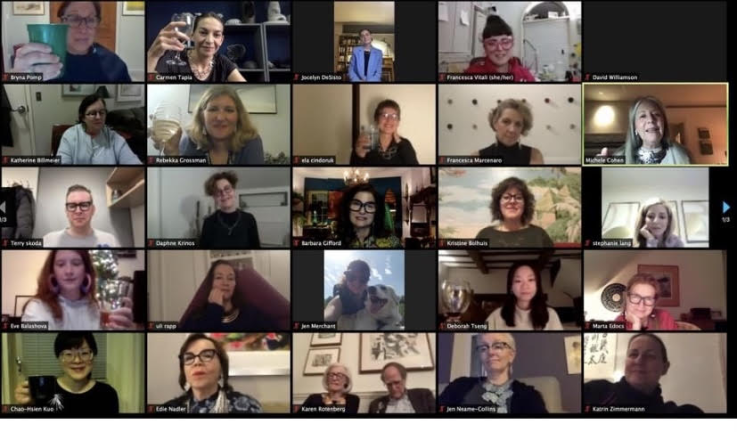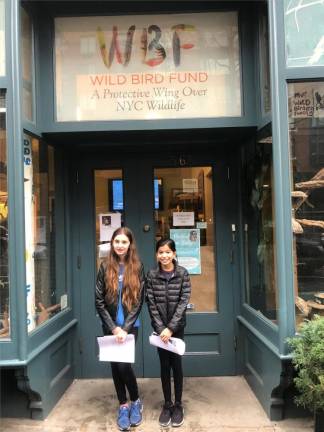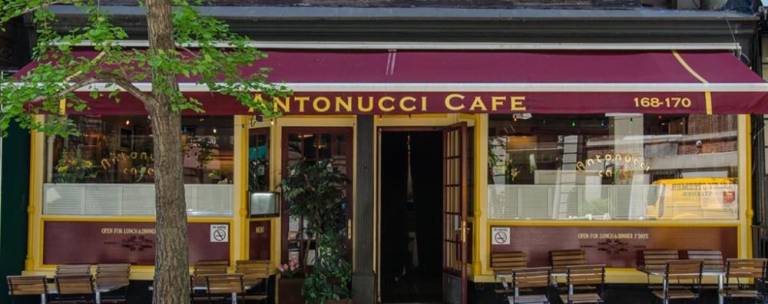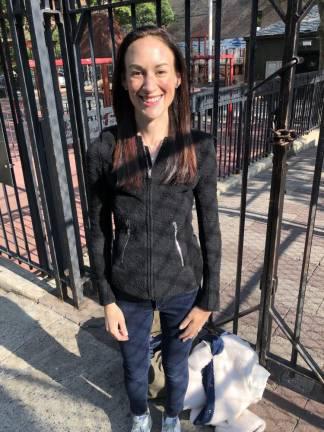Gale Brewer
Manhattan Borough President
This year has seen an amazing outpouring of volunteers. I have seen them in every corner of Manhattan - getting food to people, sweeping up parks and streets, handing out free masks and sanitizer, taking care of neighbors.
Hundreds of organizations have launched projects coordinating volunteers to run errands for homebound adults, deliver groceries and prescriptions, and even pick up and deliver absentee ballots during the election.
Some of the city’s most unsung volunteers have been the hundreds of NYCHA tenant leaders and residents who have dropped off the daily FreshDirect food deliveries beginning in the early days of the pandemic to seniors in their buildings.
And I can’t tell you how many community clean-ups I’ve participated in, from Chinatown to Hell’s Kitchen to Inwood, after trash pickups were slashed due to the budget crisis. Neighborhood residents banded together to sweep their streets and beautify their parks. (You know what we’ve found more than anything else? Bottle caps - the bottles can be redeemed for money, but not the caps, so the caps get left behind.)
So I’m grateful for generosity of Manhattanites. Our little island is better and more connected thanks to their spirit of volunteerism that’s swept the borough, and I hope it only grows in the coming year.
Daniel H. Weiss
President and CEO, The Metropolitan Museum of Art
As a lifelong New Yorker, I have always taken pride in our city, even as I recognize that living here is not without its frustrations. As we come to the end of a memorably miserable year, I find myself filled with gratitude to be part of such a remarkable community. New Yorkers constitute one of the most diverse cities in the world and no group suffered more in the early stages of the pandemic, yet these remarkable people came together to do what is required to fight back, quietly following public health guidelines and through countless acts of generosity, both large and small, doing what they can to take care of each other. Like so many of us, my spirits were lifted each day at 7:00 pm as the City erupted in a clatter of cowbells, blaring trumpets, and clanging pots and pans to express gratitude to our frontline workers, creating a joyful noise that reverberated each day for weeks and months from Soho to Harlem, from Hell’s Kitchen to Kips Bay. During these difficult months, I have witnessed countless acts of generosity, from small gestures of kindness between strangers to magnificent donations of much needed funds to help preserve or save cultural and civic institutions that are most at risk. I have always known that New Yorkers are generous, but what I have seen is at another level.
As we look across a nation that is so deeply and intractably divided, I reflect with gratitude on my scrappy, diverse, and brilliant city. Like any big family, we don’t always get along and we surely have our disagreements, but this place has the qualities that count most, including generosity, perseverance, courage, open mindedness, and inspiring ambition. Most of all, I am grateful that the concept of e pluribus unum is still alive here. As a city of immigrants, speaking some 800 different languages, we have done pretty well as a single community and I know that together we will see better days ahead.
Dr. Barbara Murphy
Chair, Department of Medicine, Icahn School of Medicine at Mount Sinai
While this has been a year of tremendous stress and anxiety for healthcare providers, I have been buoyed by the response of the people in our hospital as they have risen to meet the unprecedented challenge of this global pandemic.
Countless physicians, nurses, PA’s, social workers, respiratory techs, and many other medical and hospital staff have selflessly and repeatedly given of themselves this year. In the early days of the pandemic, when PPE was in short supply but fear was abundant, they bravely came to work and cared for the sickest of the sick. Their sacrifices cannot and will not be forgotten.
Faced with limited resources, our doctors came up with innovative ways to create ventilators from sleep apnea machines, easing a desperate shortage early on in the pandemic. Creativity and basic problem-solving were on display daily. Each and every one of our hospital employees – from physicians to maintenance workers to those who served food in the cafeteria – did what had to be done to care for the sick and protect each other. Our residents, along with many others, went above and beyond for their patients, working after their shifts to get phone chargers and tablets donated so families could stay in touch. These doctors provided a vital link to worried relatives who could not be by the bedside.
Special gratitude must go out to our research scientists who turned their collective attention to fighting this pandemic. From therapeutics to vaccines, their work truly will have an impact on each and every one of us. They made discoveries and published them at lightning speed. They collaborated seamlessly and rigorously as if their lives depended on it, because they did. And I’m grateful for the vaccine trial participants. Theirs was the ultimate example of work done for the greater good. And now with two or more vaccines on near horizon, we will all benefit from their participation and our scientists’ innovations.
Tammeca Rochester
Owner, Harlem Cycle
Surviving 2020 has been no small feat. As a mother, fiancé and business owner I’ve had to lean more on my loved ones and community more now than ever. This year has taught me to count my blessings day by day. Each day I am grateful and thankful to know that during this difficult time my family, friends, and community were by my side. I don’t know if I could have weathered the storm of 2020 alone. And even during those times that I thought I was alone my family and team were there to help carry me through the dark days. I feel immensely blessed to have a family and community that continues to have my back.
Jonathan Leshanski, DVM
At Home Veterinary
2020 has been a rotten year for a lot of people, but it’s been a good year if you were a shelter dog or cat.
COVID brought us back indoors and opened up the opportunity for people to reach out and take in pets, something that benefited the overall well-being of both the pet and the human. For us humans, it’s been about the love, company and the support of a creature who is thrilled to see you every day. For them it’s about finding love, a healthy home, and someone who cares about them.
COVID has given people a chance to take in those dogs and cats, sometimes even the difficult ones where extra training, or special needs were required. And for some of us those pets were a lifeline against loneliness, isolation, and anxiety. There are very few things that a little bit of love won’t make better.
For me personally this has been a joyous thing, seeing new families bond together. As a house call veterinarian, part of my job is assisting with end of life. That’s part of the job, and the very worst part of the job. Euthanasia literally means “the good death” and when we do it to end pain and suffering it’s an act of kindness and love, but it’s dreadfully hard. The human aspect, not just the animal aspect is incredibly hard, and probably one of the reasons that depression, burnout and suicide rates are so high among veterinarians.
And the best counter for that is always at least to my mind, puppies, kittens, new dogs, new cats - the time when joy and opportunity combine to make both owner and pet come together to share each other’s life. It’s kind of like marriage, but with fewer stormy periods, and happily for them, it’s usually lifelong.
COVID has opened that door perhaps more so than I’ve ever seen in the 20-plus years I’ve been practicing. People have opened their hearts, and their doors to pets in this city, even folks I always thought would never, ever own a pet.
That’s something to be grateful about.
Mary Gregory
City Arts Critic
When stage lights went down due to the pandemic, Lincoln Center stepped up. Lincoln Center at Home, which launched in March, started streaming free content, including full-length operas, usually shown at art theaters, and viewers enthusiastically and gratefully tuned in. The offerings were so popular that the Metropolitan Opera promised nightly free streams till they’re able to return.
Lincoln Center at Home became an online portal to the performing arts and an invaluable gift to arts lovers, students, and artists. It encompasses The Chamber Music Society, Film at Lincoln Center, Jazz at Lincoln Center, the New York Philharmonic, Julliard, Lincoln Center Theater, the NY Public Library for the Performing Arts, and the Metropolitan Opera and grew to extend far beyond its campus, the neighborhood, or even the city. Lessons were developed to replace classroom instructions, dance classes offered instruction and exercise for young and old, musicians performed from home, and in May, “Memorial for Us All,” developed along with interfaith leaders, brought us a way to memorialize those lost to COVID-19, through the healing power of music from Wynton Marsalis, Yo-Yo Ma, Kelli O’Hara, Vanessa Williams and others. In June, a premier of a solo dance choreographed by Kyle Abraham and performed by Taylor Stanley in an empty Josie Robertson Plaza seemed to capture so many of our feelings, with its poignancy and resilience. New performances are being commissioned, keeping artists employed and audiences engaged and inspired.
But what happens if a concert drops and nobody hears it? Getting the artists and the audiences together fell to the creative, resourceful public relations teams at Lincoln Center – and at arts organizations everywhere. These behind-the-scenes communicators at theaters, museums, and concert halls have become the digital impresarios and curators of 2020. Look for more to come in 2021.
Henry Timms, President and CEO of Lincoln Center for the Performing Arts, stated, “The deep creativity and generosity of artists gives me renewed appreciation for our shared humanity. The resilience of our city and our world amidst unprecedented upheaval gives me hope for our future.”
Louise Dankberg
Female District Leader, Tilden Democratic Club
It started with my coughing during the last week in March and off I went to Urgent Care where they told me to take cough suppressant as I had no other symptoms. On March 27th, I collapsed in the bathroom and was very lucky that my husband Jay was home and called an ambulance which got me to Bellevue Hospital where I continue to serve on their Community Advisory Board.
The Bellevue staff saved my life - I learned that I had only a 20% chance of survival. As a result of having been in an induced coma for three weeks and in bed for four weeks, I developed bed sores, which makes sitting still quite painful.
After being discharged, I spent weeks at Rusk Rehab at NYU Langone Hospital and at Gouverneur Rehabilitation learning to walk again. Because I am diabetic and my blood sugars were badly impacted during my COVID experience, I was readmitted to Bellevue several more times.
I’m back home now. I’ve been getting care from Americare in the form of Physical and Occupational Therapies. While I’m getting better, there’s still a way to go before I’ll be recovered. I’m still weak, not walking much, very low energy levels and have bouts of depression.
All in all, I am very lucky to be alive. I owe my life to my husband Jay and to the great treatment I received from all my health care providers.
Aida and Mirso Lekic
Tudor City Steakhouse
Although this year has been incredibly difficult and trying for many, there are still various things to be grateful for. We are grateful for the happiness and good health of our family and friends and our customers and neighbors. And we want to especially extend our gratitude to our front line and health care workers.
We are grateful that we have been able to stay open during these times and to receive growing support from our beloved customers and friends! Sometimes the hard times can seem to outweigh the good, but we have to think about what you are grateful for today, and let that overpower the rest.
Bryna Pomp
Curator, MAD About Jewelry, Museum of Arts and Design
When the pandemic swept through the city and state, the Museum of Arts and Design’s six-day annual MAD About Jewelry event featuring jewelry artists, set to happen in April, was canceled. Instead, MAD began hosting weekly webinars with the artists from the event. The most joy this year has been these weekly Zoom webinars of spending the time with the artists. Normally I get to spend one week a year with these artists altogether.
I think that art can bring people much joy and happiness. It certainly is a very welcome diversion and distraction from the tragedy that we’re all living through.
One thing that has resulted is that there’s a greater appreciation for something that is made by hand. I understand the complexity of making jewelry. These are very complex pieces and the appreciation of how much time is put into the design of them and the actual making of them really should be extraordinary.
[The pandemic has] taught me things about the city and about life in general, that we need to really appreciate what we have because of the permanency that we have just taken for granted. We’ve always thought that our favorite places and people are sort of permanent, and they’re not.
We just have to be adaptable to changing situations in life and we have to make the best of things. I’m an optimist and I always think everything is going to work out for the best. I think that’s the only attitude to have in life. I try to teach my children that also.
I was hoping that one of the results of this terrible pandemic would be that we would have a greater appreciation for each other and for our connectedness, and for just the aspect of compassion and humanity.
-Interviewed by Sami Roberts
Stephan Russo
Former Executive Director, Goddard Riverside
I want to express my gratitude for two people: Maria Guadalupe Martinez, who spearheaded a COVID relief effort that raised money for undocumented immigrants; and Brian Stokes Mitchell, for his 7 p.m. window rendition of “The Impossible Dream” in honor of the essential workers.
Martinez, affectionately known as Lupita, is one of East Harlem’s unsung heroes. She journeyed to this country from Mexico in the 1990s and quickly became a leader in her son’s school. There she discovered her passion to help other Spanish-speaking parents who had not completed their own education and, as a result, felt unprepared to help their children in school.
She established an adult education program named “Centro de Recursos Educativos Para Adultos” (Center of Educational Resources for Adults, or CREA). (I am a board member of CREA). When the pandemic hit, CREA had to suspend its classes but did not close its doors. The majority of its students are undocumented and had no access to the government benefits that kept others temporarily afloat.
Many students found themselves without work, lost family members to the virus, had difficulty paying their bills or putting food on their tables. Lupita spearheaded a COVID relief effort that has raised and disbursed nearly $90,000 to over 150 students and their families. Lupita was recently honored by the Walentas Foundation as one of its finalists in its initial David Prize competition for those working “to create a better, brighter New York City.”
I asked Lupita what she was thankful for in spite of the difficult year. “Gracias a la vida,” she said. “I am so grateful that life has brought me such joy, and that my husband and two grown sons are well and did not get sick. I feel very lucky. I am surrounded by so many wonderful people who advise and support my work at CREA. Every day I get the satisfaction that we are there to help our families get through this tough period. This has made such a difference in my life.”
At the end of April, I wrote a piece on the nightly singing of Brian Stokes Mitchell from his fifth floor window on 98th Street and Broadway. “Stokes” as he likes to be called, is the renowned Broadway actor and singer who won a 2000 Tony award for his role in “Kiss Me Kate” and received Tony nominations for his performances in “Ragtime” and “Man of La Mancha.” Stokes became sick with COVID-19 at the beginning of April and said he felt as if he “had been hit by a train.”
Stokes was grateful that he survived and could sing again. He decided to show his gratitude to all the essential frontline workers who were helping millions of New Yorkers survive the lockdown. As the nightly 7 p.m. cheering got underway, Stokes’s window would open, he would lean out from his balcony and regale the crowds below with a stunning rendition of “The Impossible Dream.”
Stokes also showed his gratitude by leading the effort to raise money for the Actors Fund, which has provided millions of dollars in emergency aid to the many workers in the theater industry who lost their jobs because of the pandemic.
Stokes’s appreciation and debt of gratitude did not end with his response to the pandemic. When Joe Biden was proclaimed the President-elect on November 7, the fifth floor window on 98th and Broadway opened and there was Stokes, raising his deep baritone voice with a message of hope and gratitude. He sang the “Impossible Dream” – and “America the Beautiful.”
Francesca Barjon
Organizer, Reclaim Pride Coalition
2020 will be marked by devastating loss from the pandemic and remembered for the “opening” of many non-Black people’s eyes to racial inequality in the U.S. I will remember this year for the continued lack of meaningful action by those that claim to care for Black people in health care, legal systems, politics, and the U.S. at large. Because 2020 is filled with an indescribable amount of pain and heartache for me and so many other Black people, it is difficult to consider gratitude.
But I will try. Because Black people always try.
I am grateful for the abolitionists, organizers, and protesters fighting to make this country better, for those fighting to defund police and reinvest money into the Black community - these are the only ways to improve Black communities. I am especially grateful for NYC activists such as Qween Jean, Joel Rivera, Edafe Okporo, Jay Walker, Jon Carter, Sasha Alexander, and Olympia Sudan.
As an organizer of the Queer Liberation March for Black lives and against police brutality, I am in deep gratitude and debt to Black Trans women who consistently fight for all of our rights. I am grateful for people who take the time to educate themselves and others. I am grateful for co-conspirators that don’t allow for the commitment of emotional or physical violence. I am grateful for those who fight oppression.
Lastly, I am grateful for the constant struggle towards liberation because none of us are free until all of us are free.
Teri Black
Founder/Artistic Director of BAL - Break A Leg Productions
On February 22, before COVID hit, we had a sold-out smash hit performance of the play “This Senseless Killing” by John Wolfson at the Theatre Lab on West 36th Street. Then came the lockdown and all our projects had to be postponed. BAL swung into immediate action by changing our performance mode and making modifications to our operation.Thankfully, our switch from live to virtual sparked, energized extended and inspired our creativity!
BAL’s Literary Committee is meeting more frequently and having more table reads of new plays via Zoom. In September, we produced our first and very successful video, “Sneak Peek,” comprised of parts of several plays of our upcoming annual SLAM one act play competition. In December, BAL launched a news series: “Break A Leg Briefings,” taped conversations with personalities from the theater world and beyond. Our first guest was the award winning playwright Lauren Gunderson. Lauren was the most produced American playwright in 2017 and 2019. Upcoming and also new in February 2021 is BAL’s “5X5 Love Festival” of short romantic comedies. To celebrate Valentine’s Day, they will be shown throughout the month of February, streamed on BAL’s website and via social media.
We are so grateful that BAL has not only survived but thrived!
Ashlynn Lawrence
Student, Columbia University School of Nursing
This year I found myself thankful for the sense of community in New York City. I moved to Manhattan from Charlotte, North Carolina in early 2019 to attend Columbia University School of Nursing. In the less than two years I’ve lived here, I’ve found it surprisingly easy to call New York home. As I prepared to cross the Mason Dixon Line, I was warned of cold and hardened people and a big, jam-packed city full of lonely souls--but what I’ve experienced in the last year has been quite the opposite.
When the COVID-19 pandemic hit New York, I watched this city band together in a fashion I didn’t think possible. On one of my days off from the hospital, I found myself in Central Park as the 7 p.m. shift change cheer began and I was surrounded by the heartwarming noise from every direction. I get goosebumps when I think about that moment: a city I was warned would be cold-hearted and isolating was showing love in the most profound way.
In the months that followed the start of the pandemic, I continued to watch the city come together - whether donating to save struggling restaurants, checking in on elderly neighbors, or everyone just wearing their masks to keep their fellow New Yorkers safe.
I am beyond thankful to all New Yorkers for exhibiting strength and resilience when it wasn’t always easy to do so. New York has had a hell of a year but I wouldn’t have dreamed of spending it anywhere else.
Maryam Banikarim
Co-founder, NYCNext
We’re sort of like the Banksy of pop-ups. We just show up.
We wanted to figure out a way to change the narrative for our city and also help the city we love, recover, rebuild, and frankly, we want to inspire others by our actions to also take action.
It’s been kind of amazing because [since our start in August] we’ve gotten connected to all kinds of artists. We did an event on the steps of the public library with Daniel Watts, who was in “Hamilton” and then Min Jin Lee and Nancy Mercado. And they read their love letters to the city, all three of them.
Our goal is to remind the world what makes New York great because it is an amazing city. We hope that others are inspired to support the places that they have incredible passion for and in a similar way.
I think what people seem to connect with about this effort is that it’s really community driven. It’s New Yorkers coming to help New Yorkers.
In Chelsea, we literally took out my son’s keyboards and asked the nail salon if we could borrow electricity from them so that we could play on the corner and you know, everybody says yes.
I remember when that Broadway moment happened [two dozen performers stood on the TKTS steps in Times Square and sang “Sunday in the Park”], and it was hard not to cry. Because it was this moment where you were like, “Oh my God, I haven’t had this experience in so long.”
New Yorkers are incredibly resilient and inventive and we’re coming together to re-imagine all kinds of things. What I hope is that we’re going to have an even more equitable city where we really make room for artists and creativity, which we all recognize is the cornerstone of the city.
-Interviewed by Sami Roberts
Dr. Megan Martin
President and co-founder, Westco
While 2020 has brought the world much sadness and heartbreak, it has also caused me personally to reflect on the people and things I am most thankful for. In my community, I am grateful for my neighbors that came together to “flatten the curve,” shop local, and lend a hand to those in need. The perseverance of our scientists has not only led to an effective vaccine in record time, but the dedication of our health care community was unparalleled during a time of crisis. This year has also given me the opportunity to slow down and focus on the important people in my life. I am so incredibly lucky to be surrounded by a supportive and loving family- especially my parents, husband, and children. The precious quality time with my children has been a bright moment that I will cherish forever.
Lily and Emma
Founders of Lily and Emma Wildlife Foundation
Gratitude.
Where do we start? There’s so much to be grateful for in the world, especially during this special year. For starters, we’re overly grateful to Ms. Kayatt, the East Side Observer of Our Town, who found us, shared our story and invited us to participate in this extraordinary article.
This year it’s also especially important to be grateful to our families, who have been there for us at all times, through thick and thin. Even when we couldn’t physically be with them, we stayed connected, both internally and through FaceTime.
We’re grateful to our friends, for keeping up the bad jokes and test grade lamenting even when everything turned upside down and we could only see each other remotely.
We’re grateful to our frontline workers, who have put themselves in danger every single day to save countless lives.
We’re grateful to the everyday people who had one moment to stop at our sales, even just to congratulate us on how far we’ve come.
We’re grateful to the earth, for giving us some sunshine in the morning and stars in the evening, to remind us that we’re not all free-floating in space. For keeping those constants in place for us to look up on and smile at.
We’re grateful for all the opportunities given to children like us who are trying to make a difference in the world. We’re grateful for the people who believe in us even as we struggle through remote seventh grade.
And, most of all, we’re grateful to all of the people that are reading this entry right now. We hope that by reading this note we have given you a little bit of hope. There really is so much to be grateful for.
Tricia Antonucci
Antonucci Café
This year, we are immensely thankful for the warmth and support our community of patrons has shown us since the very beginning of the pandemic, continuing all the way up to the present. We’ve had numerous clients check in on us, make donations to our employee fund, and offer to help in a variety of ways. We feel like clients have rallied around us, and for this we are deeply grateful and very moved.
Addie Egan
ER Nurse, NewYork-Presbyterian Weill Cornell Medical Center
Even on the most difficult days in the ER, nurse Addie Egan still feels a sense of gratitude for the good she has seen during the pandemic. We interviewed her back in May, as she worked the 7 p.m. to 7 a.m. shift at NewYork-Presbyterian Weill Cornell Medical Center during the first wave of COVID, and just caught up with her again, a few days after she received the vaccine.
When asked to contribute to our gratitude project, she was able to name multiple things that have lifted her spirits during this overwhelming time. First, she spoke about the innovation she’s witnessed in the healthcare system, such as improvements in testing as well as treatment. “Back in May, tests weren’t readily available for everyone and now we’re doing rapid testing,” she explained. “There’s been so much progress and that’s only because so many people have put their differences aside and done something for the common good.” As providers learn more about the novel virus, their approach to treatment has transitioned. Now, they are experimenting with trials of drugs such as remdesivir and limiting the use of ventilators, opting instead for more external breathing support such as proning, the practice of lying patients onto their stomachs in order to increase lung capacity.
However, she credits the camaraderie between her coworkers as the thing for which she is most grateful. Especially now, as the initial show of support from the community has lessened and the second wave is upon them, coinciding with the holiday season, morale can be low. “Back then, there was so much momentum and optimism and people were up to the challenge and now, months into it, it takes a lot more grit to keep getting up doing the same hard thing,” she explained. Egan said that the bonds between her coworkers have become “stronger than ever” and they are able to get through the hard times with a sense of humor, even while they are working overtime as the numbers are getting higher. To honor her coworkers, she continues to take their photos for her collection “Faces of the Frontlines,” which began online at the start of the pandemic and is now featured in print in her colleague Dr. Krutika Parasar Raukar’s book, “COVID-19: Inside the Global Epicenter.”
Christmas came early this year at NewYork-Presbyterian Weill Cornell Medical Center, as the hospital started administering the Pfizer vaccine to ER and ICU personnel in mid-December. Egan, who had a mild case of COVID in April, was excited for the opportunity to be among the first to receive it. “I felt confident and trust the scientists behind it,” she said.
This vaccine brought comfort and joy to the 24-year-old this Christmas as she was able to spend the holiday with her family. “For me, it is peace of mind. It is a celebration of science. It is hope,” she said of the vaccine. “It is an ability to regain a bit more of my life. It is access to people I missed a whole lot this year.”
- Interviewed by Angela Barbuti
